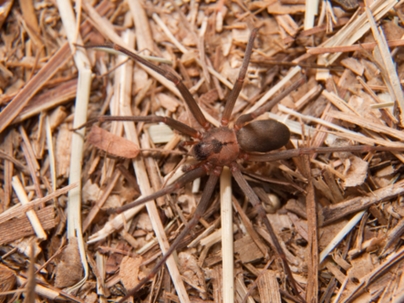Identifying wolf spiders
When Jason Wheeler was about 9 years old, he remembers seeing a spider crawling across the floor of his home. His mother, who was terrified of spiders, saw it too and decided to take action by stepping on it.
“Well, to her horror that spider shattered into a million other spiders because it turned out to be a mother wolf spider that was carrying her babies on her back,” said Wheeler, the owner of Amarillo-based Ace Pest Control. “Obviously, I was called in to help.”
Fast forward to 2022 and now plenty of other people call Wheeler for help when they see spiders in their homes. Oftentimes, those spiders turn out to be wolf spiders, which are big and scary but otherwise relatively harmless. However, some people automatically mistake them for something more sinister.
“To a homeowner, there are two kinds of spiders - black widows and brown recluses,” he said. “Fortunately, what we typically find are wolf spiders.”
Know your spiders
Because brown recluses and wolf spiders have similar coloring, are both nocturnal and can be found in the same areas during the day, they’re often mistaken for one another. Here are a few ways you can tell them apart - if you’re willing to get that close to them, that is.
Wolf spiders:
- Are a little under an inch and a half in length not including their legspan
- Have a darker-colored center and lighter-colored lines that border the center and run down their cephalothorax and abdomen
- Do not spin webs
- Are muscular and strong
- Have eight eyes
- Live and hunt alone
Brown recluse spiders:
- Are typically around ⅜ of an inch not including their legspan
- Have a silky tan abdomen and are uniform in color
- Build webs to serve as shelters but not to capture prey
- Have a distinct violin-shaped marking on their backs
- Have three pairs of eyes
- Live in groups
Treatment for wolf spiders
Light sources attract moths, flies and other insects, which in turn attracts wolf spiders looking to prey on them.
These spiders will most commonly enter a home under a door. Then, once they get inside and provided there’s a suitable amount of food, their population can self-sustain. And when you consider that a female wolf spider can produce 100 babies, which she carries on her back until they’re old enough to fend for themselves, you can see how the numbers can get out of hand fast.
Fortunately, you’re not as likely to have a full-blown wolf spider infestation inside your home as you would with other species of spiders, Wheeler said.
If a customer does call in with a wolf spider issue, which is part of Ace’s signature service, the standard course of treatment is to send a technician out to do an interior service and a comprehensive treatment on any likely harborage areas. To prevent them from coming back, the technician will also treat the perimeter of the home to make it a less attractive place for the spiders to nest.
“Spiders are actually very healthy for your lawn, but nobody wants them in their home,” Wheeler said. “By treating around the home, we can create an area that’s less hospitable for them and reduce the likelihood of spider migration due to seasonality or food shortages because that’s when you wind up with spiders in your home.”
Prevention
To prevent spiders from becoming a problem, Wheeler stresses the importance of getting rid of clutter, especially cardboard boxes. That’s because cardboard mimics a spider’s natural habitat almost perfectly and if a pile of boxes is left in an undisturbed area, you’re just asking for spider-related trouble.
Additionally, make sure that firewood and stacks of lumber - both of which can be an ideal harborage for spiders - are stored well away from your home’s exterior.
Finally, make sure that you’ve got your routine pest control services scheduled so you can prevent outbreaks of spiders - or any other unwelcome creature - before they start. But should you notice a pest problem, Wheeler and his team have it covered.
“Our service includes unlimited interior application so if our clients have an issue at any point, even between services, they can call us,” he said. “We'll come back out and address the situation at no additional charge.”
Wolf spider treatments are covered under Ace’s signature pest control package. To find out more about how our team can help protect your home and your family, contact us by clicking here.

